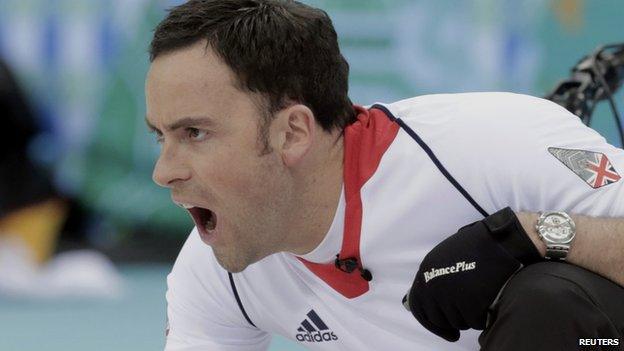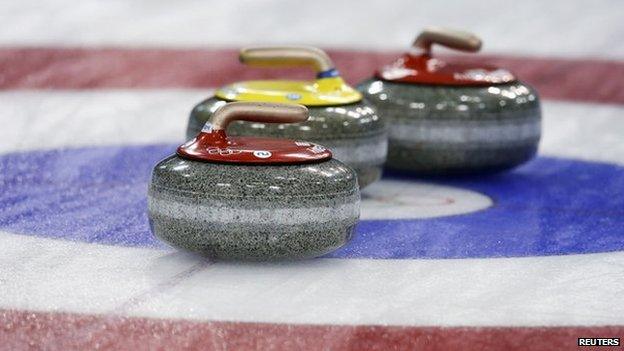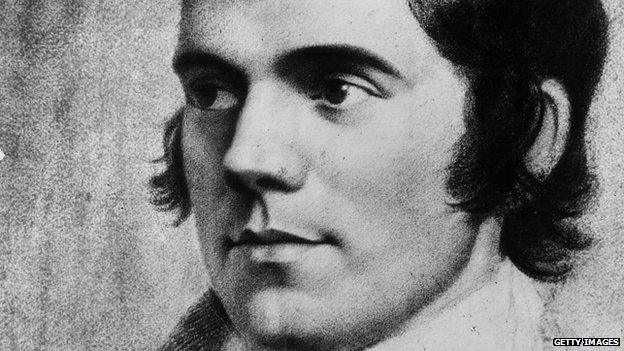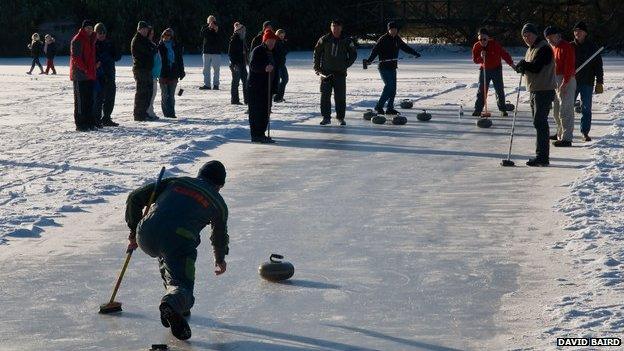Sochi 2014: Why is southern Scotland crazy for curling?
- Published

David Murdoch is one of many curlers who have learned their sport in the south of Scotland
The rest of Great Britain is just catching the bug.
But in the south of Scotland, they have been crazy for curling for ages.
What some have cruelly dismissed as "housework on ice" has been part of the sporting landscape here for generations.
The town of Lockerbie is at the very heart of that passion.
On Thursday, local women Anna Sloan and Claire Hamilton were part of Eve Muirhead's rink which won bronze.
And now David Murdoch is going for gold in the men's event as the skip of Team GB as they face Canada in the final.
But why does Dumfries and Galloway have a particular affinity with the sport which is now enjoying much wider appeal?
Facilities
The Royal Caledonian Curling Club (RCCC) - the national body for the sport in Scotland - lists 22 rinks across the country with curling facilities.
Four of them - nearly 20% - are situated in the south of the country.

Youngsters looking to take up the sport have access to facilities across the south of Scotland
Stranraer, Lockerbie, Dumfries and Kelso all enjoy such provision.
It helps to ensure that most youngsters with a passion for the game do not have to travel too far to practise and play.
Role models
Winning Olympic medals at Sochi will ensure that Lockerbie's David Murdoch, Anna Sloan and Claire Hamilton as well as Stranraer's Vicki Adams have many imitators.
But they themselves are following in the footsteps of plenty of other top level players.

Bronze medallists Claire Hamilton, Anna Sloan and Vicki Adams all have links to southern Scotland
Hammy McMillan, from Stranraer, was a world champion in 1999 - a title Murdoch has also won twice.
In the women's game, Lockerbie's Carolyn Hutchison skipped a rink to the Scottish title in 1997.
Stranraer's Gail Munro repeated that feat in 2008.
History
The RCCC says early evidence of the sport is scarce but a first reference is thought to have come in 1541 when notary John McQuhin recorded a challenge about "throwing stones across the ice" between a monk at Paisley Abbey and a relative of the abbot.
"From then on we find references to the game with increasing frequency, and it is possible to say that by the end of the 18th Century curling was played throughout the Lowlands of Scotland," it added.
"Poets of Kirkcudbrightshire, Renfrewshire and Lanarkshire celebrated the game in published poems."

There is said to be no evidence Robert Burns played the game but he certainly knew of its existence
The RCCC concluded that although there was "no evidence" that Scotland's most famous poet, Robert Burns, played the game - he certainly knew of it.
It cites lines of Tam Samson's Elegy as proof of that fact with its reference:
"When Winter muffles up his cloak,
And binds the mire like a rock;
When to the loughs the curlers flock,
Wi' gleesome speed."
Burns was born in Ayrshire but spent the last years of his life in Dumfries and Galloway.
Weather
Although far from the coldest part of the country, southern Scotland enjoyed good conditions for what was, at first, an outdoor sport.
Originally curlers played on either natural lochs or specially-constructed ponds.
However, some seasons went barren, as ice never formed.

Curling started life as an outdoor sport and some matches are still played on ponds or lochs
The Grand Caledonian Curling Club was instituted in 1838 and four years later it obtained the necessary patronage to become the Royal Caledonian Curling Club.
"From 1838 onwards the game exploded in popularity until by the last decades of the 19th Century every county had at least one club affiliated with the Royal Club, and almost every parish in the land had its custom-made curling pond," said the RCCC.
One of the big attractions was the institution of so-called Grand Matches between the north and south of Scotland.
Dedication
The sport is easy to pick up but devilishly hard to master.
It takes years of practise to achieve the apparently effortless ability to send a stone smoothly across the ice to a small target some distance away.
Even those who don't make Olympic champions go to great lengths to show their love of the sport.

Curlers from southern Scotland reclaimed their world record for the longest match last year
In 2012, 10 south of Scotland curlers managed to break the world record for the longest match ever played.
The two teams fought it out for 61 hours 39 minutes at Dumfries Ice Bowl - beating the previous mark of 57 hours and 44 seconds.
That record was snatched off them but, undeterred, they set a new record last year.
The group played for 73 hours 6 minutes and 52 seconds.
- Published21 February 2014
- Attribution
- Published20 February 2014
- Attribution
- Published19 February 2014
- Attribution
- Published18 February 2014